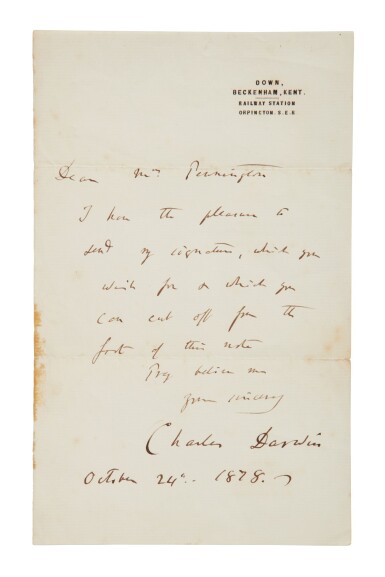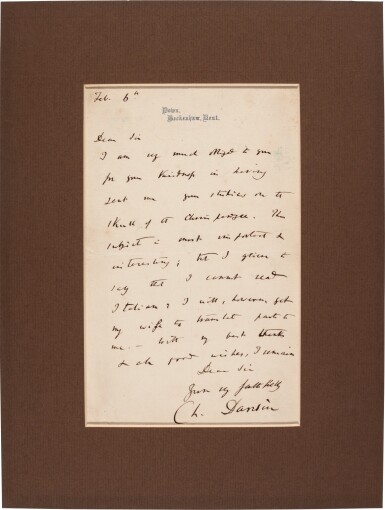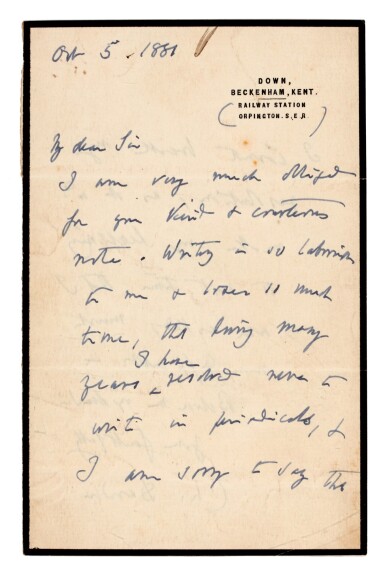DARWIN, Charles (1809-1882). Letter signed ('Charles Darwin') to [Dr Rudolph Heine], Down, 16 (corrected from 15) March [1865], 'I am pleased to hear that you have been interested in my work on the Origin of Species. Your law of inheritance I dare say is true & may have some bearing on the modification of species; but I fear it would be difficult to prove it with sufficient clearness to allow of its use', 2 pages, 8vo , bifolium, a draft letter by the recipient to Sir James Beart Simonds, 7 November 1865, on the subject of horses' teeth occupying the head and foot of the letter, and part of the integral blank. Provenance : Stargardt sale, 26 March 1992, lot 582; private collection.
DARWIN, Charles (1809-1882). Letter signed ('Charles Darwin') to [Dr Rudolph Heine], Down, 16 (corrected from 15) March [1865], 'I am pleased to hear that you have been interested in my work on the Origin of Species. Your law of inheritance I dare say is true & may have some bearing on the modification of species; but I fear it would be difficult to prove it with sufficient clearness to allow of its use', 2 pages, 8vo , bifolium, a draft letter by the recipient to Sir James Beart Simonds, 7 November 1865, on the subject of horses' teeth occupying the head and foot of the letter, and part of the integral blank. Provenance : Stargardt sale, 26 March 1992, lot 582; private collection. Letter 4786f in the Darwin Correspondence Project, where it is incorrectly dated 15 March. Darwin is responding to a letter of Heine's dated 10 March (letter 4783), in which he proposes a hereditary law of use and disuse, i.e. that the offspring inherit most strongly those characteristics which the parents have most used before conception.
DARWIN, Charles (1809-1882). Letter signed ('Charles Darwin') to [Dr Rudolph Heine], Down, 16 (corrected from 15) March [1865], 'I am pleased to hear that you have been interested in my work on the Origin of Species. Your law of inheritance I dare say is true & may have some bearing on the modification of species; but I fear it would be difficult to prove it with sufficient clearness to allow of its use', 2 pages, 8vo , bifolium, a draft letter by the recipient to Sir James Beart Simonds, 7 November 1865, on the subject of horses' teeth occupying the head and foot of the letter, and part of the integral blank. Provenance : Stargardt sale, 26 March 1992, lot 582; private collection.
DARWIN, Charles (1809-1882). Letter signed ('Charles Darwin') to [Dr Rudolph Heine], Down, 16 (corrected from 15) March [1865], 'I am pleased to hear that you have been interested in my work on the Origin of Species. Your law of inheritance I dare say is true & may have some bearing on the modification of species; but I fear it would be difficult to prove it with sufficient clearness to allow of its use', 2 pages, 8vo , bifolium, a draft letter by the recipient to Sir James Beart Simonds, 7 November 1865, on the subject of horses' teeth occupying the head and foot of the letter, and part of the integral blank. Provenance : Stargardt sale, 26 March 1992, lot 582; private collection. Letter 4786f in the Darwin Correspondence Project, where it is incorrectly dated 15 March. Darwin is responding to a letter of Heine's dated 10 March (letter 4783), in which he proposes a hereditary law of use and disuse, i.e. that the offspring inherit most strongly those characteristics which the parents have most used before conception.



.jpg)










Testen Sie LotSearch und seine Premium-Features 7 Tage - ohne Kosten!
Lassen Sie sich automatisch über neue Objekte in kommenden Auktionen benachrichtigen.
Suchauftrag anlegen